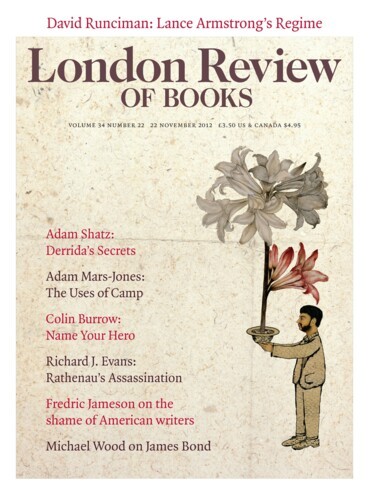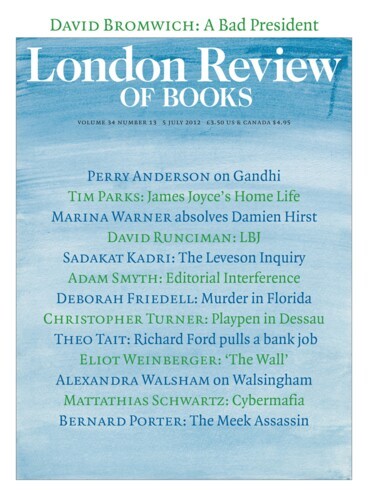A couple of years ago, Swedish politics were shaken up by the fresh-faced young Jimmy Åkesson’s Sverigedemokraten getting 5.7 per cent of the parliamentary vote on an anti-immigrant ticket. Now Centerpartiet – traditionally the party of the countryside – has been taken over by another fresh face, Annie Lööf (pronounced ‘lurve’), advocating unlimited immigration. Both are considered to be of the right, but totally opposite rights: the Sweden Democrats nationalistic and chauvinist, the Centre Party just about as ‘new liberal’ as you can get. (This kind of contradiction isn’t unique to the right. The left has its state socialists at one end of the spectrum and anarcho-socialists at the other.)
Bernard Porter
Bernard Porter’s recent books include Imperial Britain: What the Empire Wasn’t and Empire Ways. He lives in Stockholm.
Manly Voices: Macaulay & Son
Bernard Porter, 22 November 2012
Thomas Babington Macaulay – later Lord Macaulay, and ‘Tom’ to Catherine Hall – was the most influential of all British historians. Sales of the first two volumes of his great History of England, published in 1848, rivalled those of Scott and Dickens. The main reason for his popularity, apart from his literary style, was that he flattered the English by crediting them...
I took early retirement from my last university job about a dozen years ago. One of my reasons was the way in which my post as head of the history department had become ‘managerialised’. I had mercifully forgotten the horrors of this until I recently stumbled on a copy of one of my memos to my colleagues. Here it is. (I’m not sure of the date.)
First, a number of disclaimers. I’m not an uncritical admirer of Julian Assange, especially in relation to what he has admitted he has done – quite apart from the criminal allegations against him – in his personal life. In brief, he seems to me to be a bit of a cad. Beyond that, I have no opinion as to his legal guilt or otherwise. I’m also not entirely in favour of WikiLeaks’ activities. I think you need to preserve diplomatic confidentiality in many areas. To qualify this, however, I’m not terribly disturbed – or impressed – by most of the ‘revelations’ in the diplomatic cables released by WikiLeaks in 2010, few of which can reasonably be thought to threaten any nation’s security. (Dignity and reputation a little, perhaps. That’s no bad thing.) On the other side, I’m certainly not anti-Swedish. I live there much of the time, and consider its political, economic and social institutions far superior to Britain’s. Recent events have led me to question the fairness of Sweden’s judicial processes, a view shared by a number of Swedes; but that should be put in the context of my overall Swedophilia. Lastly, I’m not a ‘conspiracy theorist’ – this in relation to suspicions that the whole Assange affair was a put-up job by the CIA – although, having worked in this area (the history of ‘counter-subversion’), I would never dismiss the possibility of any ‘conspiracy’ out of hand. I hope that’s clear. The Assange affair really is a very curious one.
Rotten, Wicked, Tyrannical: The Meek Assassin
Bernard Porter, 5 July 2012
If Spencer Perceval is remembered at all today it’s probably as the answer to a question in a pub quiz: who is the only British prime minister ever to have been assassinated? But both he and his nemesis, John Bellingham, are more interesting than this implies, and the fatal act that brought them together, Andro Linklater thinks, is more significant and also more mysterious. They have...
Pieces about Bernard Porter in the LRB
Lumpers v. Splitters: How to Build an Empire
Ferdinand Mount, 31 March 2016
‘Those who make many species are the “splitters” and those who make few are the “lumpers”,’ Charles Darwin wrote in 1857 to his friend, the great botanist...
Read anywhere with the London Review of Books app, available now from the App Store for Apple devices, Google Play for Android devices and Amazon for your Kindle Fire.
Sign up to our newsletter
For highlights from the latest issue, our archive and the blog, as well as news, events and exclusive promotions.



